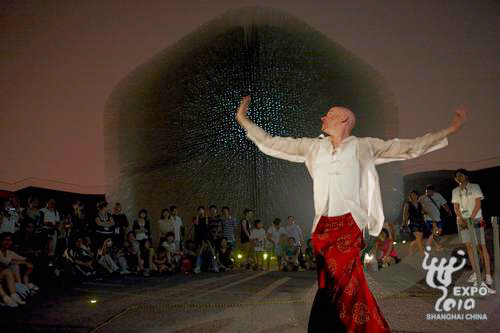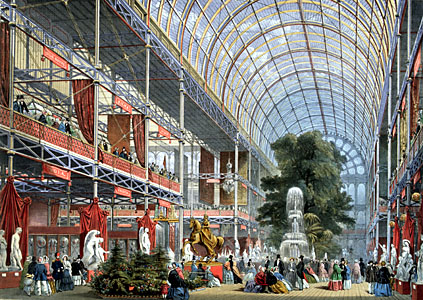
In this file photo, British artist Alan Grieg performs at the UK Pavilion July 6. [expo2010.cn]
LONDON - Seed Cathedral, the pavilion of the United Kingdom at Shanghai World Expo, will be under spotlights once again as the UK National Pavilion Day is due on Wednesday there.
The UK pavilion, themed "Building on the Past, Shaping Our future," features a display of various plant seeds instead of those old-time industrial glories hosted at Crystal Palace in London.
<
The structure, emphasizing seeds and nature, is widely recognized as a herald of emerging green tides which will surely surge in the future.
The Crystal Palace was built to host the Great Exhibition of Works of Industry of all Nations held in London in 1851, which is now recognized as the very first World Expo.
The dazzling differences between the two buildings not only mirror the changes of the architecture, but also the historical transformation of the world.
As the sole pavilion to host the Great Exhibition at Hyde Park in 1851, the Crystal Palace accommodated more than 100,000 items on display, which was highlighted by industrial products, like engines, cranes, mills ..., all of which represented the most advanced technology at that time.
The Crystal Palace itself is an industrial spectacle. Although the data in different records vary slightly, it is a three-storyed glasshouse more than 500 meters long and more than 100 meters wide and built with 4,500 tons of iron and 300,000 pieces of glass within just several months.
"The vastness of the building, with all its decorations and exhibits ... uniting the industry and art of all nations of the earth, was quite overwhelming," commented Queen Victoria in her diary after attending the opening ceremony of the Exhibition on May 1, 1851 in the Crystal Palace.
After the Exhibition, the Crystal Palace was moved somewhere else and later destroyed by fire. Today, if we go to its original location in Hyde Park, London, there is just a large grassland utilized as a series of football pitches, and their vastness remind you of the grandiose structure of iron and glass.
< The structure, emphasizing seeds and nature, is widely recognized as a herald of emerging green tides which will surely surge in the future.
The Crystal Palace was built to host the Great Exhibition of Works of Industry of all Nations held in London in 1851, which is now recognized as the very first World Expo.
The dazzling differences between the two buildings not only mirror the changes of the architecture, but also the historical transformation of the world.
As the sole pavilion to host the Great Exhibition at Hyde Park in 1851, the Crystal Palace accommodated more than 100,000 items on display, which was highlighted by industrial products, like engines, cranes, mills ..., all of which represented the most advanced technology at that time.
The Crystal Palace itself is an industrial spectacle. Although the data in different records vary slightly, it is a three-storyed glasshouse more than 500 meters long and more than 100 meters wide and built with 4,500 tons of iron and 300,000 pieces of glass within just several months.
"The vastness of the building, with all its decorations and exhibits ... uniting the industry and art of all nations of the earth, was quite overwhelming," commented Queen Victoria in her diary after attending the opening ceremony of the Exhibition on May 1, 1851 in the Crystal Palace.
After the Exhibition, the Crystal Palace was moved somewhere else and later destroyed by fire. Today, if we go to its original location in Hyde Park, London, there is just a large grassland utilized as a series of football pitches, and their vastness remind you of the grandiose structure of iron and glass.

An artist's rendition of the Crystal Palace
However, Britons have built another national symbol - the Seed Cathedral - in the Shanghai World Expo after one and a half century, but in a totally different style.
The 20-meter-high cube-like building featured the seeds embedded in its walls and ceilings as well as 60,000 slender transparent rods "planted" on its surface. The rods can wave with wind like a dandelion, which has actually become its nickname among some visitors.
At the end of each transparent rod, there is one or more encased seeds, which endowed the building its name.
"Seeds are time capsules of life, enabling plants to travel through time to the next generation. So they represent the future and the importance of plant diversity to human livelihoods," said Dr. Robin Probert from Britain's Kew Millennium Seed Bank, a partner of the Seed Cathedral project.
As imports of seeds need technical inspection, the Kew Millennium Seed Bank has invited its Chinese counterpart the Kunming Institute of Botany to provide the seeds.
Dr. Yang Xiangyun from the institute told Xinhua that they provided all the 260,000 seeds in 900 species, including food crops,fruits,flowers, among others.
"Our Pavilion encourages visitors to look again at the role of nature," said a spokesperson in Britain's Foreign &Commonwealth Office for the project in the Shanghai Expo.
In 1851, Britain was at the peak of its power and splendor. As the cradle of the Industrial Revolution, Britain was then far advanced than the rest of the world. It exported commodities ranging from big battleships to small pins.
Queen Victoria was so proud of Britain's achievement and agreed with her husband Prince Albert to hold the Great Exhibition. The main aim was to showcase British goods and skills, and their exhibits occupy nearly half of the Crystal Palace.
"UK was sharing its vision of the future at that time, a world in which economic development would be driven by heavy industry. Not a vision of doom and gloom but a vision of hope and prosperity," commented Probert.
But the doom and gloom did come to Britain when its environment was overburden by industries, reducing the famous Thames River into a sewage over a long period. The British people realized the problem and turned to a green path for development, and its new national pavilion Seed Cathedral at the Shanghai Expo has embodied such a fundamental change.
"The lessons we have learnt mean that we can once again (in the World Expo) demonstrate leadership and innovation in how the world can adapt to the environmental consequences of economic development", said Probert.
Yes, at the Shanghai World Expo, Britain shows its "green and pleasant urban landscape" in two walkways just besides the Seed Cathedral. Britons are proud again, saying in their Expo website that London is 40 percent green, "making it the greenest city of its size in the world."
Britain, the old industrial empire, now is pioneering in some green areas, including measures against climate change. It led in passing a Climate Change Act and publishing a national strategy of Low Carbon Transition. It has promised a much bigger carbon emission cut than many other developed countries.
Britain's Foreign &Commonwealth Office at the expo told Xinhua that "We have moved from a new industrial age to one where we must use technology and innovation to protect nature and work with it."
The change of Britain comes as the whole world has changed.
In the first World Expo, people focused on industrial products and natural resources. Besides machines, there are monster specimens of coal that weighed more than 20 tons. But now the earth is on the verge of overburden, and countries are displaying what's green and energy efficient.
In the Shanghai Expo, the United States also said its pavilion is built with environment-friendly materials; Russia opened a future energy corner in its pavilion; and China has presented a number of electric or biofueled vehicles.
Dr.David Tyfield is an expert on low carbon in the Lancaster University, Britain. He went to the Shanghai Expo just for releasing a report about low carbon transition in the world.
"The important point is that China cannot simply repeat the processes of (British) economic development, with major pollution being followed only at a later date by cleaning up", he said.
He said he believed that the developing countries could directly adapt to a green economy and even take a lead in the transition.
One and a half century ago, the Crystal Palace's glory urged the world to catch up with the industrial age. Now the Seed Cathedral, together with other environmental-friendly pavilions at the Shanghai Expo, are ushering in a new age of green.